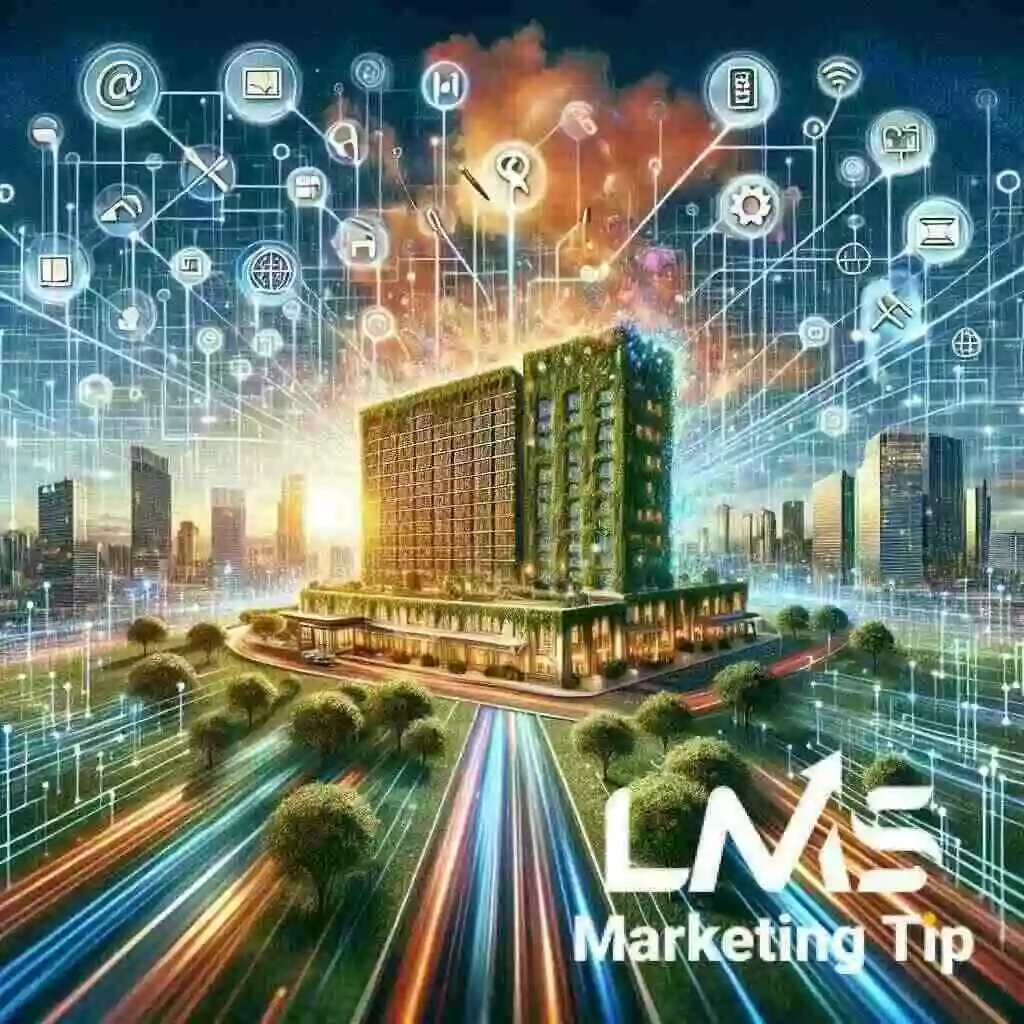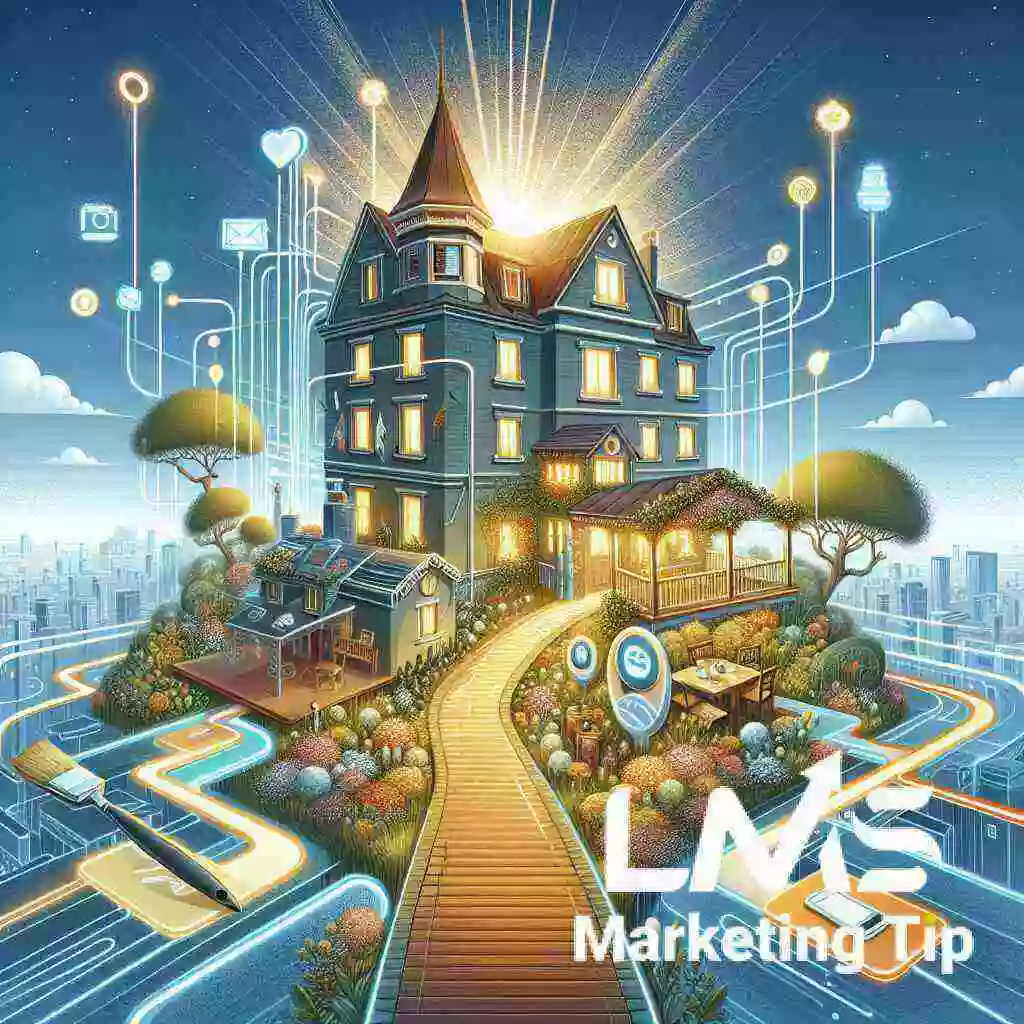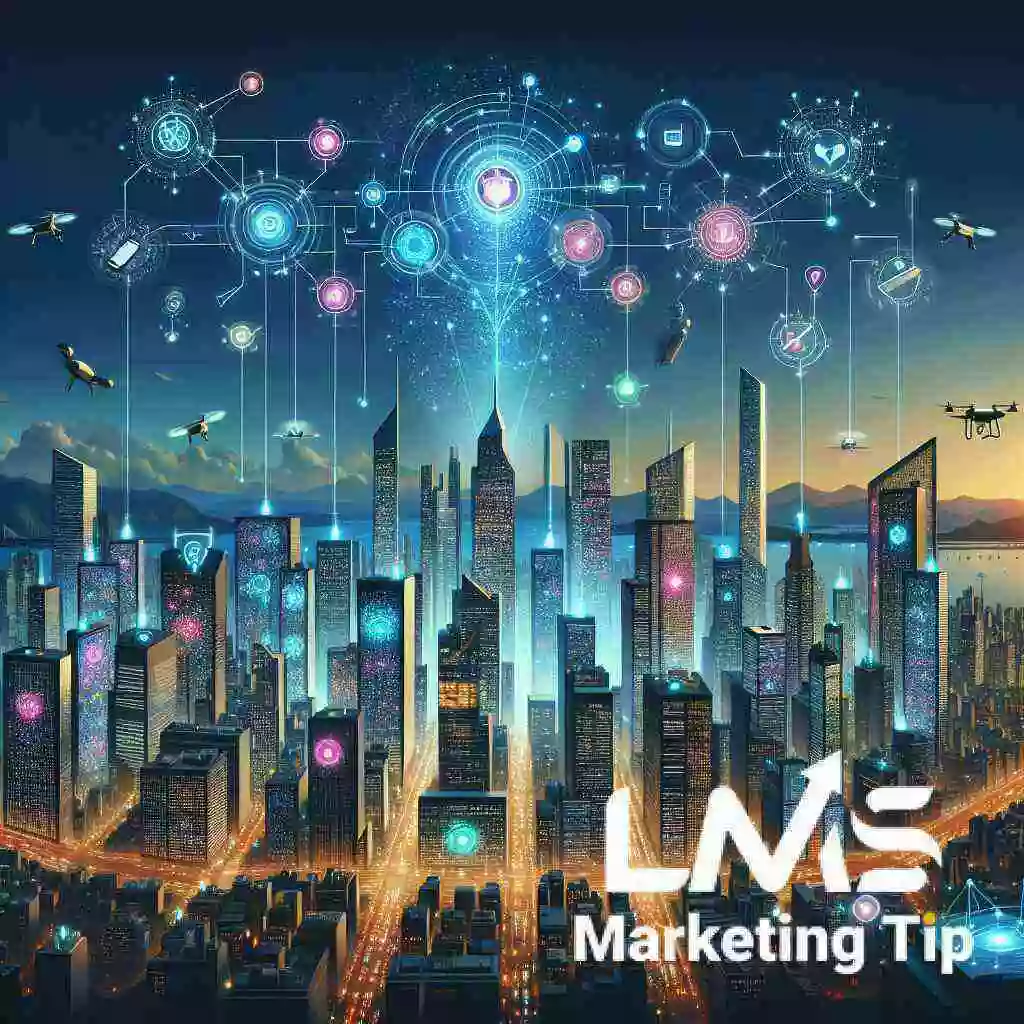
Introduction to Digital Marketing for Hotels
Understanding the Role of Digital Marketing in the Hospitality Industry
Digital marketing has become an indispensable tool for hotels, offering them a dynamic platform to reach potential guests, enhance brand visibility, and ultimately drive bookings. As the hospitality industry evolves with technological advances, the role of digital marketing has expanded, touching every aspect of the hotel guest experience. From the moment potential travelers start their journey online, searching for “hotels near me,” to post-stay reviews and loyalty programs, digital marketing strategies are at play. They help hotels differentiate themselves in a crowded market, connect with their target audience on various digital channels, and adapt to changing customer expectations and industry trends.
Critical Components of a Successful Hotel Digital Marketing Strategy
A successful hotel digital marketing strategy encompasses several components, each critical to achieving measurable results. At its core, it starts with a comprehensive hotel website design that is not only visually appealing but also user-friendly and optimized for conversions. Search Engine Optimization (SEO) and Local SEO strategies ensure that your hotel appears prominently in search engine results, making it easier for potential guests to find you. Incorporating hotel social media marketing and email marketing into your strategy enables hotels to engage with guests on platforms they frequently use, creating opportunities for personalized communication and promotion. Additionally, leveraging analytics and marketing technologies allows hotels to gather data, analyze performance, and fine-tune their strategies for improved ROI.
To effectively address the needs and preferences of your target audience, it is crucial to have a clear understanding of who they are and what they are looking for. Segmentation and targeting become core aspects of developing a digital marketing strategy that resonates with your potential guests and compels them to book a stay.
The Importance of a Strong Online Presence for Hotels
In today’s digital age, a solid online presence for hotels is no longer optional; it is a necessity. The majority of travel planning and booking is done online, with potential guests comparing their options across multiple platforms before making a decision. A solid online presence not only increases your visibility but also builds trust and credibility with your target audience. From a well-designed website to active social media profiles and positive online reviews, each element of your online presence works together to tell the story of your hotel. This cohesiveness in digital marketing efforts not only attracts more guests but also fosters guest loyalty, encouraging repeat business and word-of-mouth referrals.
Building a solid online presence involves a mix of marketing tactics, leveraging social media for hotels, enhancing your website’s user experience, and utilizing digital advertising to reach potential guests where they spend a significant amount of their time online. By adopting a holistic digital marketing approach, hotels can effectively leverage their online presence to stand out in a competitive market, drive more direct bookings, and achieve long-term success in the hospitality industry.
Developing a Hotel Digital Marketing Plan
Setting Clear Objectives and Goals
Developing a hotel digital marketing plan begins with setting clear objectives and goals. These should be specific, measurable, achievable, relevant, and time-bound (SMART). Objectives may include increasing direct bookings through the hotel’s website, enhancing online visibility in search engine results, or growing the hotel’s following on social media platforms. Establishing these goals early on provides a clear direction for your digital marketing efforts and a way to measure success. For example, suppose the objective is to increase direct bookings by 20% within the following year. In that case, strategies such as improving hotel website design improvements and implementing targeted advertising campaigns can be prioritized.
Identifying the Hotel’s Target Audience
Identifying the hotel’s target audience is a critical step in crafting an impactful digital marketing strategy. Understanding who your guests are, including their demographics, interests, behaviors, and preferences, enables you to tailor your marketing messages and offers to meet their specific needs. Different hotels may cater to various segments, such as business travelers, families, couples, or solo travelers. Conducting market research and analyzing guest data can provide valuable insights into your target audience, enabling you to create personalized experiences that resonate with them. Remember, the more you know about your guests, the better you can serve them through targeted marketing campaigns and customized offerings.
Choosing the Right Digital Marketing Channels for Hotels
Selecting the appropriate digital marketing channels is essential for reaching your identified target audience where they are most active and engaged. With numerous options available, from search engines and social media platforms to email marketing and online advertising, hotels must carefully consider which channels will be most effective for achieving their marketing objectives.
For instance, SEO and local SEO strategies for hotels are crucial for improving visibility in search results, especially for potential guests searching for “hotels near me.” Social media platforms offer a way to engage with guests through compelling content and targeted advertising. Email marketing provides an avenue for personalized communication, driving bookings, and promoting loyalty among past guests. Additionally, Pay-Per-Click (PPC) advertising can be an effective way to drive targeted traffic to your hotel’s website quickly. Each channel has its strengths and can be part of a comprehensive digital marketing plan, ensuring that your hotel reaches its target audience effectively and efficiently.
Optimizing Hotel Website Design and Functionality
Critical Elements of an Effective Hotel Website
An effective hotel website serves as the digital front door to your property. It’s where first impressions are formed and where the journey from potential guest to booked guest begins. Essential elements of an effective hotel website include stunning visuals that showcase the property, user-friendly navigation that guides visitors effortlessly through the site, and compelling content that tells the story of the hotel experience. Ensuring your website is mobile-friendly is no longer optional, as a significant portion of travelers use their smartphones for research and bookings. A seamless, responsive web design, which Web design principles emphasize, is crucial for engaging these potential guests. Additionally, clear calls to action (CTAs) should be positioned strategically across the site to prompt visitors to take the next step, whether it’s making a reservation, signing up for a newsletter, or contacting the hotel for more information.
Improving Hotel Website User Experience
The user experience (UX) of your hotel website can significantly impact a visitor’s decision to book a stay. An intuitive and enjoyable user experience design in hotels can make the difference between a completed booking and a lost opportunity. Essential aspects of UX to focus on include fast loading times, as visitors expect information to be delivered quickly and efficiently. Minimizing friction points during the navigation process encourages exploration and reduces bounce rates. For improved UX, ensure that your website’s architecture is logical and straightforward, with easily accessible information on rates, availability, amenities, and location. Regularly gathering user feedback through surveys or usability tests can provide valuable insights into areas of your website that may need enhancement, ensuring that the site evolves to meet the needs of your guests continually.
Integrating a Booking Engine for Direct Reservations
Direct bookings are a coveted goal for hotels, reducing dependency on third-party reservation systems and protecting profit margins. Integrating a booking engine into your hotel’s website is a critical component of achieving this goal. A user-friendly direct booking engine should allow potential guests to view room availability and rates in real-time, select room types, and confirm their reservations with ease. Key features of an effective booking engine include a clear presentation of different room options and rates, the ability to upsell or cross-sell additional services like spa treatments or dining reservations, and seamless payment processing. Security is also paramount, as guests need to feel confident in the safety of their personal and payment information. By making the booking process as simple and streamlined as possible, hotels can encourage more direct reservations, enhancing guest satisfaction and loyalty from the very first interaction.
Incorporating these vital elements into your hotel’s web development strategy enhances not only the aesthetic appeal of your website but also its functionality and effectiveness in converting visitors into guests. With a focus on design, user experience, and an integrated booking engine, hotels can create a powerful online presence that stands out in the competitive hospitality industry.
Implementing Hotel SEO Strategy
Keyword Research for Hotel SEO
The foundation of a successful SEO strategy for hotels begins with thorough keyword research. Understanding what potential guests are searching for when planning their travels is paramount. This involves identifying both broad and long-tail keywords related to your hotel, its location, amenities, and unique selling propositions. Tools like Google Keyword Planner and Ahrefs can provide insights into search volumes, competition levels, and trends in guest searches. With hotels being a part of a highly competitive industry, integrating unique keywords, such as “eco-friendly hotels in New York” or “family-friendly hotels near theme parks,” can differentiate your property from competitors. Remember, the goal is to target keywords that not only drive traffic but also attract potential guests who are likely to book a stay.
On-page SEO Tactics for Hotel Websites
Once you’ve identified your target keywords, implementing on-page SEO tactics becomes crucial. This includes optimizing title tags, meta descriptions, headers, and content to include your chosen keywords in a natural and meaningful way. Your website’s structure also plays a significant role in SEO, with a clear, logical layout and easy navigation enhancing both user experience and search engine rankings. Each page of your website should focus on a specific keyword theme, providing valuable, in-depth information that addresses the search intent of your potential guests. Optimizing images by compressing file sizes and adding descriptive alt text can further improve page loading times and accessibility, contributing to a better overall user experience. Additionally, incorporating internal links throughout your website can help distribute page authority and guide visitors to relevant information, increasing the likelihood of conversion.
Utilizing Local SEO for Hotels to Increase Visibility Near Me
In the hospitality industry, local SEO is invaluable. When potential guests search for “hotels near me” or “hotels in [Location],” you want your hotel to appear prominently in the search results. This can be achieved through various techniques, such as claiming and optimizing your Google My Business (GMB) listing, ensuring NAP (Name, Address, Phone number) consistency across online platforms, and gathering positive reviews. Utilizing local keywords in your website’s content and metadata can further enhance visibility in local search results. Engaging with local events and communities online and listing your hotel on local directories and travel guides can also drive local SEO success. By focusing on local SEO, hotels can significantly increase their visibility to potential guests searching in their immediate area, resulting in more direct bookings and a more substantial online presence.
Incorporating these SEO strategies explicitly tailored for hotels can not only boost your site’s visibility in search engine results but also attract and convert more potential guests. With an emphasis on keyword research, on-page optimization, and local SEO, hotels can leverage SEO to stand out in a highly competitive market.
Leveraging Social Media for Hotel Marketing
Choosing the Right Social Media Platforms for Your Hotel
When it comes to leveraging social media for hotel marketing, one size does not fit all. The key to success lies in identifying which platforms your target audience uses most frequently and engaging them there. For instance, Instagram and Pinterest are excellent for showcasing the visual appeal of your hotel through high-quality photos and videos, making them ideal for reaching younger travelers and couples looking for a picturesque getaway. LinkedIn, on the other hand, is more suited for business hotels aiming to attract corporate events and conferences due to its professional user base. Facebook remains a versatile platform that is useful for reaching a broad audience with its dynamic advertising capabilities and extensive user base. Understanding the strengths and demographics of each platform will enable you to tailor your strategy to meet your hotel’s marketing goals effectively.
Creating Engaging Content to Promote Hotel Brand Awareness
Engaging content is the cornerstone of any effective hotel social media marketing strategy. This content not only needs to capture the essence of your hotel but also engage, entertain, and inform your audience. Share behind-the-scenes looks into hotel operations, highlight unique amenities or services, and showcase guest experiences through testimonials and user-generated content. Posting interactive content such as polls, quizzes, and contests can increase engagement and foster a sense of community among your followers. Additionally, leveraging storytelling to share your hotel’s history or the local culture can significantly augment brand awareness and loyalty. The goal is to create content that resonates with your audience, encouraging them to envision themselves enjoying all your hotel has to offer.
Hotel Social Media Advertising Campaigns
Social media advertising campaigns offer hotels a powerful tool to reach potential guests beyond organic reach. Platforms like Facebook and Instagram allow for highly targeted advertising based on demographics, interests, behaviors, and location, making it possible to reach specific segments of your target market effectively. For instance, a coastal hotel can target ads to users who have shown interest in beach vacations, while a city hotel can target business travelers. Creating compelling ads that feature enticing offers, stunning visuals, and clear calls-to-action can drive traffic to your website, increase bookings, and boost overall revenue. Leveraging retargeting ads to reach users who have visited your website but did not book can also effectively close the gap between interest and action. Regularly analyzing the performance of your advertising campaigns is crucial to understanding what resonates with your audience and optimizing future efforts for even better results.
Hotel Email Marketing and Guest Retention Strategies
Building an Effective Hotel Email Marketing List
The foundation of a successful email marketing campaign lies in building a robust and engaged email list. For hotels, this means collecting email addresses from a variety of touchpoints throughout the guest journey, from initial booking inquiries to post-check-out. Offering incentives like free Wi-Fi access or discounts on future stays can encourage guests to opt into your list. It’s also essential to ensure that the process of subscribing is as easy as possible, with clear calls to action on your website and social media platforms. Remember, the quality of your email list is far more important than quantity; a smaller, engaged audience can lead to better results in terms of direct bookings and guest retention. Incorporating hotel marketing tips that emphasize personalized and value-driven content will further enhance the effectiveness of your email marketing efforts.
Crafting Email Marketing Campaigns for Hotels
Once you have established a strong email list, the next step is to craft compelling email marketing campaigns designed to drive bookings and foster guest loyalty. Segmenting your email list based on guest preferences, booking history, and behavior can allow for more targeted and personalized communication. For example, you could send tailored offers for a romantic weekend getaway to couples who have previously stayed at your hotel or promote family-friendly amenities to previous guests who have booked family rooms. Including attractive visuals, engaging content, and clear calls to action are crucial elements of a successful email campaign. Utilizing hotel email marketing mastery techniques, such as A/B testing subject lines and monitoring open rates and click-through rates, can help you refine your approach and improve the effectiveness of your campaigns over time.
Using Email Marketing for Guest Engagement and Retention
Effective email marketing doesn’t stop after a guest books a stay. Continuing to engage with your guests through email after their visit can significantly enhance guest retention and encourage repeat bookings. Sending post-stay surveys to gather feedback, offering special discounts for their next visit, or keeping them informed about upcoming events and promotions at your hotel are ways to keep your hotel top of mind. Additionally, celebrating guest milestones, such as birthdays or anniversaries, with personalized email messages can create a lasting connection and show guests that you value their business. By leveraging digital advertising for hotels near me, hotels can further support their email marketing efforts, ensuring that they are reaching potential guests at every stage of their journey. Through thoughtful and strategic use of email marketing, hotels can drive bookings, enhance guest satisfaction, and ultimately foster loyalty and advocacy among their guest base.
Exploring Hotel PPC and Advertising Campaigns
Benefits of PPC for Hotels
Pay-per-click (PPC) advertising stands as a cornerstone within the digital marketing armory of hotels, offering unparalleled flexibility and immediate results in their efforts to attract potential guests. The primary benefit of hotel PPC advertising lies in its ability to target specific audiences based on demographics, interests, search behavior, and even geographical location. Hotels can showcase their offerings directly to individuals actively seeking accommodations, thereby increasing the chances of conversion. Moreover, PPC campaigns provide measurable metrics, allowing hotels to gauge the effectiveness of their ads in real-time, adjust their strategies accordingly, and manage budgets with precision. This laser-focused approach ensures that every marketing dollar spent is an investment toward attracting qualified leads, making PPC an essential strategy for hotels aiming to maximize their online visibility and booking rates.
Creating Successful Hotel PPC Campaigns
Crafting successful PPC campaigns for hotels requires a meticulous understanding of both the target audience and the unique selling propositions (USPs) of the hotel. To start, conducting thorough keyword research is essential. Identifying keywords that potential guests are likely to use when searching for accommodations ensures that your ads appear in the right searches. Utilizing engaging ad copy that highlights special offers, amenities, or unique experiences available at your hotel can significantly improve click-through rates. Additionally, optimizing landing pages to reflect the promises made in your ads helps in converting visitors into bookings.
A vital component of PPC campaigns is the use of ad extensions, such as location, contact information, or links to specific sections of the hotel’s website (e.g., testimonials, photo galleries, reservation pages), which can enhance the visibility and attractiveness of your ads. Embracing tools like remarketing, which targets users who have visited your website but did not book, can also rekindle interest and potentially convert these visits into reservations. Regular analysis and refinement based on campaign performance data ensure that your hotel’s PPC efforts are continually optimized for the best possible return on investment.
Measuring and Analyzing Hotel Advertising Campaign Performance
To realize the full potential of PPC and advertising initiatives, hotels must commit to ongoing measurement and analysis of their campaigns. Key performance indicators (KPIs), such as click-through rate (CTR), cost per click (CPC), conversion rate, and return on ad spend (ROAS), offer valuable insights into the effectiveness of each ad and campaign. Tools like Google Analytics and Google Ads provide a comprehensive overview of how users interact with your ads and website, enabling you to identify which areas of your campaign are performing well and which require adjustment.
Analyzing the customer journey from ad click-through to booking provides clues on how to streamline the path to conversion. A/B testing different elements of your ads, such as headlines, descriptions, and images, can reveal preferences and trends among your target audience, allowing for further campaign optimization. Additionally, keeping abreast of hospitality industry digital trends can help you adapt your strategies to match evolving guest expectations and market conditions. By diligently measuring and refining their advertising strategies, hotels can enhance their competitive edge, ensuring their PPC campaigns continually contribute to their growth and success in a dynamic digital marketplace.
Utilizing Content Marketing and SEO to Boost Hotel Bookings
Developing a Content Marketing Strategy for Hotels
Developing a robust content marketing strategy is an essential step for hotels looking to enhance their online presence and boost bookings. Content marketing for hotels involves creating and sharing valuable information that appeals to your target audience, positioning your hotel as the preferred choice for their stay. To begin, it’s crucial to identify the topics that resonate most with your potential guests, such as travel guides, local attractions, and hotel amenities. Implementing a blog on your hotel’s website can serve as a central hub for this information, attracting prospects through informative and engaging content. By aligning your content strategy with hotel SEO tactics, hotels can improve their search engine rankings, driving more organic traffic to their websites. Consistency in publishing high-quality content also plays a vital role, as it helps to establish your hotel as a trustworthy source of information, encouraging repeat visits and enhancing brand loyalty.
Leveraging Blogging and Visual Content for Hotel SEO
Blogging and the use of compelling visual content are powerful tools that can significantly impact your hotel’s SEO efforts. Blogs provide an opportunity to incorporate keywords and topics that potential guests are searching for, such as “best places to eat near me” or “top attractions in [City].” By producing content that matches these search queries, hotels can increase their visibility in search engine results, drawing more traffic to their sites. Additionally, integrating high-quality images and videos of your hotel and its surroundings not only makes your content more engaging but also can improve your website’s SEO if these visuals are optimized correctly. Including descriptive file names and alt text for images, for example, improves accessibility and helps search engines understand and index your content more effectively. Moreover, visual content is more likely to be shared on social media, further expanding your reach and attracting a broader audience to your website.
Content Distribution and Promotion Strategies for Hotels
Once you’ve developed compelling content, the next step is to ensure that it reaches your target audience through strategic distribution and promotion. Social media platforms are invaluable channels for sharing your content, allowing you to engage directly with potential and current guests. Tailored posts that highlight recent blog entries or showcase your hotel’s amenities can drive traffic back to your website and promote direct bookings. Email marketing is another effective channel for content distribution. By sending out regular newsletters that include blog post excerpts, exclusive offers, and upcoming events, hotels can keep their audience engaged and informed.
Additionally, partnering with local businesses or travel influencers to share your content can extend your reach significantly. Collaborative articles or promotional swaps can introduce your hotel to new audiences, leveraging the credibility and followers of your partners. Keep in mind the importance of measuring the performance of your content through analytics. Tracking engagement, shares, and website traffic resulting from your distributed content will help refine your strategy and ensure that your content marketing efforts are aligned with your hotel’s booking goals.
Review Management and Online Reputation for Hotels
Monitoring and Responding to Hotel Reviews
In the digital era, online reviews have become a cornerstone for hotels’ reputations, acting as a double-edged sword. Positive reviews can enhance hotel visibility and trustworthiness, attracting new guests, while negative feedback can deter potential bookings. Therefore, actively monitoring and responding to hotel reviews on platforms like TripAdvisor, Google, and social media sites is vital. Each review, whether praising or criticizing, presents an opportunity to showcase customer service excellence. Timely and thoughtful responses to negative reviews can mitigate their impact, demonstrating the hotel’s commitment to guest satisfaction. Furthermore, thanking guests for positive feedback encourages a culture of appreciation and recognition.
Implementing effective strategies for search engine optimization for hotels involves not just technical adjustments to a website or content creation but also meticulous attention to review management. Engaging with guest feedback significantly influences your hotel’s online visibility and ranking on search engines, as frequent positive reviews can improve SEO performance.
Managing Online Reputation to Enhance Hotel Booking Confidence
Online reputation management for hotels transcends mere review responses; it encompasses all digital interactions that shape public perception. Establishing a robust digital presence through a well-designed website, dynamic social media profiles, and engaging content marketing is foundational. However, seamlessly integrating review management strengthens your hotel’s narrative, building a cohesive brand image that resonates with potential guests.
Tools and platforms dedicated to online reputation management can assist hotels in aggregating and analyzing reviews and mentions across the web, enabling proactive engagement and insight-driven strategies to enhance service quality. Actively monitoring social media mentions and online discussions about your hotel allows for real-time engagement with guests and can highlight areas for improvement or innovation.
Encouraging satisfied guests to share their experiences online can further bolster your hotel’s reputation. Creating incentives for leaving reviews, such as discounts on future stays or entries into contests, can motivate guests to contribute positive feedback. Additionally, incorporating reviews into your hotel’s website and marketing materials, with permission, can serve as powerful testimonials for prospective guests.
Encouraging Positive Reviews from Guests
A proactive approach to cultivating positive reviews involves creating exceptional guest experiences that exceed expectations. Training staff to recognize and seize opportunities to enhance guest satisfaction can result in memorable stays that guests are eager to share. Follow-up communications post-stay, thanking guests for their business and inviting them to review their experience, add a personal touch that can encourage feedback.
Leveraging technology, such as mobile apps or email campaigns, can streamline the review solicitation process, making it easy and convenient for guests to leave feedback. Implementing guest satisfaction surveys can provide valuable insights and highlight guests likely to leave positive reviews, whom you can then directly invite to share their experiences on public platforms.
Ultimately, fostering an environment that prioritizes guest satisfaction, actively engages with feedback, and continuously seeks to improve service standards is essential for encouraging positive reviews. By doing so, hotels can significantly impact their online reputation, driving increased bookings and revenue in a competitive digital marketplace.
Conclusion: Crafting a Comprehensive Digital Marketing Strategy for Your Hotel
Key Takeaways for Hotel Digital Marketing
In the ever-evolving landscape of the hospitality industry, adopting a fluid and comprehensive digital marketing strategy is paramount for hotels aspiring to stand out. From leveraging the power of SEO to optimize your online presence for queries like “hotels near me” to engaging potential guests through compelling content on social media, the facets of digital marketing are both broad and deeply interlinked. A successful marketing journey involves teamwork in digital hotel marketing strategies, tailored web development, and consistent brand messaging across all platforms to capture the imaginations and bookings of a diverse audience.
Building a robust online presence through a well-designed website, engaging social media content, and responsive customer service sets the foundation. Adding layers of strategic SEO, personalized email marketing campaigns, and dynamic PPC advertising will place your hotel in the spotlight, driving both traffic and direct bookings. It’s a continuum of efforts that, when executed correctly, not only boosts visibility but also fosters guest loyalty and advocacy.
Next Steps: Implementing and Optimizing Your Hotel’s Digital Marketing Habits
Embarking on the digital marketing road is a journey of continual learning and adaptation. The initial step is to conduct a thorough audit of your current digital presence, identifying gaps and opportunities for improvement. Partnering with a seasoned digital marketing agency specializing in the hospitality sector can offer invaluable insights and accelerate your growth. Agencies have the expertise and tools necessary to craft bespoke strategies that resonate with your target audience and reflect the latest digital trends.
Consider investing in web development for hotels, focusing on mobile optimization and user experience to ensure that your site is both beautiful and functional. Active engagement on social media platforms, tailored to your audience’s preferences, can enhance your brand’s voice and reach. Simultaneously, refining your SEO and PPC campaigns will ensure that your hotel appears at the top of relevant search results, driving more organic and paid traffic, respectively.
Additionally, harnessing the power of analytics allows for the measurement and refinement of strategies for better performance. Regularly updating your practices in line with emerging digital marketing trends and technologies will help maintain a competitive edge.
Staying Ahead of Hospitality Industry Digital Trends
The hospitality industry is notably dynamic, with guest expectations and digital marketing trends constantly evolving. Staying informed about the latest developments, from AI-driven personalization to virtual reality tours, ensures that your hotel not only meets but exceeds modern travelers’ expectations. Engaging with your guests through innovative mediums and offering them unique, memorable experiences will set your hotel apart.
Invest time in attending industry conferences, webinars, and courses focused on digital innovation in hospitality marketing. Networking with peers and subscribing to leading hospitality and marketing blogs are excellent ways to stay ahead of the curve. Adaptability and a forward-thinking mindset are crucial to navigating the future of hospitality digital marketing successfully.
In conclusion, crafting a comprehensive digital hotel marketing strategy demands a multifaceted approach, continuous optimization, and an eagerness to innovate. By harnessing the strategy discussed, from refining your web presence and embracing SEO to engaging in targeted advertising and staying abreast of industry trends, your hotel can achieve and sustain remarkable growth. Remember, at the heart of effective marketing lies a profound understanding of your guests’ desires and the commitment to deliver exceptional experiences at every touchpoint.
Frequently Asked Questions
Question: What key elements should be included in a hotel website design to ensure a solid online presence?
Answer: A compelling hotel website design is pivotal for establishing a solid online presence. Key elements include visually appealing and high-quality images of the hotel and its amenities, user-friendly navigation that allows users to quickly find information, and mobile optimization to ensure the website is accessible on smartphones and tablets. Additionally, integrating a direct booking engine is crucial for facilitating seamless reservations alongside clear calls-to-action (CTAs) that guide visitors toward booking. With Marketing Tip’s expertise in web design and development, hotels can create an engaging and functional website that not only reflects their brand but also drives direct bookings and enhances guest experiences.
Question: How can SEO and local SEO for hotels improve my hotel’s visibility in search engine results?
Answer: SEO and local SEO for hotels are essential in improving your hotel’s visibility in search engine results. By optimizing your website with relevant keywords, including those related to your hotel’s location, amenities, and unique offerings, you can rank higher in search results, making it easier for potential guests to find you. Local SEO tactics, such as optimizing your Google My Business listing and ensuring your hotel’s name, address, and phone number (NAP) are consistent across the web, further enhance visibility, especially for searches like “hotels near me.” Marketing Tip provides expert SEO services that strategically boost your hotel’s online presence, driving more organic traffic to your website and increasing direct bookings.
Question: What strategies can be used to leverage social media marketing for hotels?
Answer: Leveraging social media marketing for hotels involves creating engaging content that highlights your hotel’s amenities, unique experiences, and guest testimonials. Choosing the right social media platforms where your target audience is most active is vital. Strategies include hosting contests to increase engagement, using targeted social media advertising to reach potential guests, and sharing behind-the-scenes content to build brand awareness. Utilizing user-generated content can also play a significant role in authentic promotion. Marketing Tip specializes in creating tailored social media strategies that not only boost your hotel’s brand awareness but also drive engagement and direct bookings.
Question: How can “Leveraging Digital Marketing for Hotels Near Me” help in crafting a comprehensive digital marketing plan for my hotel?
Answer: “Leveraging Digital Marketing for Hotels Near Me” acts as a comprehensive guide to understanding the multifaceted approach needed for successful hotel digital marketing. From emphasizing the importance of a well-designed website and the implementation of a solid SEO strategy to the utilization of social media, email marketing, and PPC campaigns, this guide outlines critical strategies that can be tailored to meet your hotel’s needs. Marketing Tip, with its deep expertise in digital marketing, can help you integrate these strategies into a coherent digital marketing plan that targets your audience effectively, enhances your online presence, increases direct bookings, and ultimately drives revenue. Trust Marketing Tip to distill these insights into actionable strategies for your hotel’s success.
Question: Can email marketing and guest retention strategies significantly impact guest loyalty and repeat bookings?
Answer: Absolutely; email marketing and guest retention strategies are powerful tools for enhancing guest loyalty and encouraging repeat bookings. By crafting personalized email campaigns that cater to the interests and preferences of past guests, hotels can keep their brands at the top of their minds. Sending regular updates about special offers, hotel news, and local events, as well as exclusive incentives for return visits, fosters a sense of value and belonging among guests. Utilizing email marketing mastery, Marketing Tip can help your hotel develop effective email strategies that engage and retain guests, turning them into loyal advocates of your brand.











